- Home
- William Gibson
The Miracle Worker Page 2
The Miracle Worker Read online
Page 2
KATE [INEXORABLY]: Are you willing to put her away?
(Now HELEN’S face darkens in the same rage as at herself earlier, and her hand strikes at KATE’S lips. KATE catches her hand again, and HELEN begins to kick, struggle, twist.)
KELLER: Now what?
KATE: She wants to talk, like—be like you and me.
(She holds HELEN struggling until we hear from the child her first sound so far, an inarticulate weird noise in her throat such as an animal in a trap might make; and KATE releases her. The second she is free HELEN blunders away, collides violently with a chair, falls, and sits weeping. KATE comes to her, embraces, caresses, soothes her, and buries her own face in her hair, until she can control her voice.)
Every day she slips further away. And I don’t know how to call her back.
AUNT EV: Oh, I’ve a mind to take her up to Baltimore myself. If that doctor can’t help her, maybe he’ll know who can.
KELLER [PRESENTLY, HEAVILY]: I’ll write the man, Katie.
(He stands with the baby in his clasp, staring at HELEN’S head, hanging down on KATE’S arm.
The lights dim out, except the one on KATE and HELEN. In the twilight, JAMES, AUNT EV, and KELLER move off slowly, formally, in separate directions; KATE with HELEN in her arms remains, motionless, in an image which overlaps into the next scene and fades only when it is well under way.
Without pause, from the dark down left we hear a man’s voice with a Greek accent speaking:)
ANAGNOS:—who could do nothing for the girl, of course. It was Dr. Bell who thought she might somehow be taught. I have written the family only that a suitable governess, Miss Annie Sullivan, has been found here in Boston—
(The lights begin to come up, down left, on a long table and chair. The table contains equipment for teaching the blind by touch—a small replica of the human skeleton, stuffed animals, models of flowers and plants, piles of books. The chair contains a girl of 20, ANNIE SULLIVAN, with a face which in repose is grave and rather obstinate, and when active is impudent, combative, twinkling with all the life that is lacking in HELEN’S, and handsome; there is a crude vitality to her. Her suitcase is at her knee. ANAGNOS, a stocky bearded man, comes into the light only towards the end of his speech.)
ANAGNOS:—and will come. It will no doubt be difficult for you there, Annie. But it has been difficult for you at our school too, hm? Gratifying, yes, when you came to us and could not spell your name, to accomplish so much here in a few years, but always an Irish battle. For independence.
(He studies ANNIE, humorously; she does not open her eyes.)
This is my last time to counsel you, Annie, and you do lack some—by some I mean all—what, tact or talent to bend. To others. And what has saved you on more than one occasion here at Perkins is that there was nowhere to expel you to. Your eyes hurt?
ANNIE: My ears, Mr. Anagnos.
(And now she has opened her eyes; they are inflamed, vague, slightly crossed, clouded by the granular growth of trachoma, and she often keeps them closed to shut out the pain of light.)
ANAGNOS [SEVERELY]: Nowhere but back to Tewksbury, where children learn to be saucy. Annie, I know how dreadful it was there, but that battle is dead and done with, why not let it stay buried?
ANNIE [CHEERILY]: I think God must owe me a resurrection.
ANAGNOS [A BIT SHOCKED]: What?
ANNIE [TAPS HER BROW]: Well, He keeps digging up that battle!
ANAGNOS: That is not a proper thing to say, Annie. It is what I mean.
ANNIE [MEEKLY]: Yes. But I know what I’m like, what’s this child like?
ANAGNOS: Like?
ANNIE: Well— Bright or dull, to start off.
ANAGNOS: No one knows. And if she is dull, you have no patience with this?
ANNIE: Oh, in grownups you have to, Mr. Anagnos. I mean in children it just seems a little—precocious, can I use that word?
ANAGNOS: Only if you can spell it.
ANNIE: Premature. So I hope at least she’s a bright one.
ANAGNOS: Deaf, blind, mute—who knows? She is like a little safe, locked, that no one can open. Perhaps there is a treasure inside.
ANNIE: Maybe it’s empty, too?
ANAGNOS: Possible. I should warn you, she is much given to tantrums.
ANNIE: Means something is inside. Well, so am I, if I believe all I hear. Maybe you should warn them.
ANAGNOS [FROWNS]: Annie. I wrote them no word of your history. You will find yourself among strangers now, who know nothing of it.
ANNIE: Well, we’ll keep them in a state of blessed ignorance.
ANAGNOS: Perhaps you should tell it?
ANNIE [BRISTLING]: Why? I have enough trouble with people who don’t know.
ANAGNOS: So they will understand. When you have trouble.
ANNIE: The only time I have trouble is when I’m right.
(But she is amused at herself, as is ANAGNOS.)
Is it my fault it’s so often? I won’t give them trouble, Mr. Anagnos, I’ll be so ladylike they won’t notice I’ve come.
ANAGNOS: Annie, be—humble. It is not as if you have so many offers to pick and choose. You will need their affection, working with this child.
ANNIE [HUMOROUSLY]: I hope I won’t need their pity.
ANAGNOS: Oh, we can all use some pity.
(Crisply)
So. You are no longer our pupil, we throw you into the world, a teacher. If the child can be taught. No one expects you to work miracles, even for twenty-five dollars a month. Now, in this envelope a loan, for the railroad, which you will repay me when you have a bank account. But in this box, a gift. With our love.
(ANNIE opens the small box he extends, and sees a garnet ring. She looks up, blinking, and down.)
I think other friends are ready to say goodbye.
(He moves as though to open doors.)
ANNIE: Mr. Anagnos.
(Her voice is trembling.)
Dear Mr. Anagnos, I—
(But she swallows over getting the ring on her finger, and cannot continue until she finds a woebegone joke.)
Well, what should I say, I’m an ignorant opinionated girl, and everything I am I owe to you?
ANAGNOS [SMILES]: That is only half true, Annie.
ANNIE: Which half? I crawled in here like a drowned rat, I thought I died when Jimmie died, that I’d never again—come alive. Well, you say with love so easy, and I haven’t loved a soul since and I never will, I suppose, but this place gave me more than my eyes back. Or taught me how to spell, which I’ll never learn anyway, but with all the fights and the trouble I’ve been here it taught me what help is, and how to live again, and I don’t want to say goodbye. Don’t open the door, I’m crying.
ANAGNOS [GENTLY]: They will not see.
(He moves again as though opening doors, and in comes a group of girls, 8-year-olds to 17-year-olds; as they walk we see they are blind. ANAGNOS shepherds them in with a hand.)
A CHILD: Annie?
ANNIE [HER VOICE CHEERFUL]: Here, Beatrice.
(As soon as they locate her voice they throng joyfully to her, speaking all at once; ANNIE is down on her knees to the smallest, and the following are the more intelligible fragments in the general hubbub.)
CHILDREN: There’s a present. We brought you a going-away present, Annie!
ANNIE: Oh, now you shouldn’t have—
CHILDREN: We did, we did, where’s the present?
SMALLEST CHILD [MOURNFULLY]: Don’t go, Annie, away.
CHILDREN: Alice has it. Alice! Where’s Alice? Here I am! Where? Here!
(An arm is aloft out of the group, waving a present; ANNIE reaches for it.)
ANNIE: I have it. I have it, everybody, should I open it?
CHILDREN: Open it! Everyone be quiet! Do, Annie! She’s opening it. Ssh!
(A settling of silence while ANNIE unwraps it. The present is a pair of smoked glasses, and she stands still.)
Is it open, Annie?
ANNIE: It’s open.
CHILDR
EN: It’s for your eyes, Annie. Put them on, Annie! ’Cause Mrs. Hopkins said your eyes hurt since the operation. And she said you’re going where the sun is fierce.
ANNIE: I’m putting them on now.
SMALLEST CHILD [MOURNFULLY]: Don’t go, Annie, where the sun is fierce.
CHILDREN: Do they fit all right?
ANNIE: Oh, they fit just fine.
CHILDREN: Did you put them on? Are they pretty, Annie?
ANNIE: Oh, my eyes feel hundreds of per cent better already, and pretty, why, do you know how I look in them? Splendiloquent. Like a race horse!
CHILDREN [DELIGHTED]: There’s another present! Beatrice! We have a present for Helen, too! Give it to her, Beatrice. Here, Annie!
(This present is an elegant doll, with movable eyelids and a momma sound.)
It’s for Helen. And we took up a collection to buy it. And Laura dressed it.
ANNIE: It’s beautiful!
CHILDREN: So don’t forget, you be sure to give it to Helen from us, Annie!
ANNIE: I promise it will be the first thing I give her. If I don’t keep it for myself, that is, you know I can’t be trusted with dolls!
SMALLEST CHILD [MOURNFULLY]: Don’t go, Annie, to her.
ANNIE [HER ARM AROUND HER]: Sarah, dear. I don’t want to go.
SMALLEST CHILD: Then why are you going?
ANNIE [GENTLY]: Because I’m a big girl now, and big girls have to earn a living. It’s the only way I can. But if you don’t smile for me first, what I’ll just have to do is—
(She pauses, inviting it.)
SMALLEST CHILD: What?
ANNIE: Put you in my suitcase, instead of this doll. And take you to Helen in Alabama!
(This strikes the children as very funny, and they begin to laugh and tease the smallest child, who after a moment does smile for ANNIE.)
ANAGNOS [THEN]: Come, children. We must get the trunk into the carriage and Annie into her train, or no one will go to Alabama. Come, come.
(He shepherds them out and ANNIE is left alone on her knees with the doll in her lap. She reaches for her suitcase, and by a subtle change in the color of the light, we go with her thoughts into another time. We hear a boy’s voice whispering; perhaps we see shadowy intimations of these speakers in the background.)
BOY’S VOICE: Where we goin’, Annie?
ANNIE [IN DREAD]: Jimmie.
BOY’S VOICE: Where we goin’?
ANNIE: I said—I’m takin’ care of you—
BOY’S VOICE: Forever and ever?
MAN’S VOICE [IMPERSONAL]: Annie Sullivan, aged nine, virtually blind. James Sullivan, aged seven—What’s the matter with your leg, Sonny?
ANNIE: Forever and ever.
MAN’S VOICE: Can’t he walk without that crutch?
(ANNIE shakes her head, and does not stop shaking it.)
Girl goes to the women’s ward. Boy to the men’s.
BOY’S VOICE [IN TERROR]: Annie! Annie, don’t let them take me—Annie!
ANAGNOS [OFFSTAGE]: Annie! Annie?
(But this voice is real, in the present, and ANNIE comes up out of her horror, clearing her head with a final shake; the lights begin to pick out KATE in the KELLER house, as ANNIE in a bright tone calls back.)
ANNIE: Coming!
(This word catches KATE, who stands half turned and attentive to it, almost as though hearing it. Meanwhile ANNIE turns and hurries out, lugging the suitcase.
The room dims out; the sound of railroad wheels begins from off left, and maintains itself in a constant rhythm underneath the following scene; the remaining lights have come up on the KELLER homestead. JAMES is lounging on the porch, waiting. In the upper bedroom which is to be ANNIE’S, HELEN is alone, puzzledly exploring, fingering and smelling things, the curtains, empty drawers in the bureau, water in the pitcher by the washbasin, fresh towels on the bedstead. Downstairs in the family room KATE turning to a mirror hastily adjusts her bonnet, watched by a Negro servant in an apron, VINEY.)
VINEY: Let Mr. Jimmy go by hisself, you been pokin’ that garden all day, you ought to rest your feet.
KATE: I can’t wait to see her, Viney.
VINEY: Maybe she ain’t gone be on this train neither.
KATE: Maybe she is.
VINEY: And maybe she ain’t.
KATE: And maybe she is. Where’s Helen?
VINEY: She upstairs, smellin’ around. She know somethin’ funny’s goin’ on.
KATE: Let her have her supper as soon as Mildred’s in bed, and tell Captain Keller when he comes that we’ll be delayed tonight.
VINEY: Again.
KATE: I don’t think we need say again. Simply delayed will do.
(She runs upstairs to ANNIE’S room, VINEY speaking after her.)
VINEY: I mean that’s what he gone say. “What, again?”
(VINEY works at setting the table. Upstairs KATE stands in the doorway, watching HELEN’S groping explorations.)
KATE: Yes, we’re expecting someone. Someone for my Helen.
(HELEN happens upon her skirt, clutches her leg; KATE in a tired dismay kneels to tidy her hair and soiled pinafore.)
Oh, dear, this was clean not an hour ago.
(HELEN feels her bonnet, shakes her head darkly, and tugs to get it off. KATE retains it with one hand, diverts HELEN by opening her other hand under her nose.)
Here. For while I’m gone.
(HELEN sniffs, reaches, and pops something into her mouth, while KATE speaks a bit guiltily.)
I don’t think one peppermint drop will spoil your supper.
(She gives HELEN a quick kiss, evades her hands, and hurries downstairs again. Meanwhile CAPTAIN KELLER has entered the yard from around the rear of the house, newspaper under arm, cleaning off and munching on some radishes; he sees JAMES lounging at the porch post.)
KELLER: Jimmie?
JAMES [UNMOVING]: Sir?
KELLER [EYES HIM]: You don’t look dressed for anything useful, boy.
JAMES: I’m not. It’s for Miss Sullivan.
KELLER: Needn’t keep holding up that porch, we have wooden posts for that. I asked you to see that those strawberry plants were moved this evening.
JAMES: I’m moving your—Mrs. Keller, instead. To the station.
KELLER [HEAVILY]: Mrs. Keller. Must you always speak of her as though you haven’t met the lady?
(KATE comes out on the porch, and JAMES inclines his head.)
JAMES [IRONIC]: Mother.
(He starts off the porch, but sidesteps KELLER’S glare like a blow.)
I said mother!
KATE: Captain.
KELLER: Evening, my dear.
KATE: We’re off to meet the train, Captain. Supper will be a trifle delayed tonight.
KELLER: What, again?
KATE [BACKING OUT]: With your permission, Captain?
(And they are gone. KELLER watches them offstage, morosely.
Upstairs HELEN meanwhile has groped for her mother, touched her cheek in a meaningful gesture, waited, touched her cheek, waited, then found the open door, and made her way down. Now she comes into the family room, touches her cheek again; VINEY regards her.)
VINEY: What you want, honey, your momma?
(HELEN touches her cheek again. VINEY goes to the sideboard, gets a tea-cake, gives it into HELEN’S hand; HELEN pops it into her mouth.)
Guess one little tea-cake ain’t gone ruin your appetite.
(She turns HELEN toward the door. HELEN wanders out onto the porch, as KELLER comes up the steps. Her hands encounter him, and she touches her cheek again, waits.)
KELLER: She’s gone.
(He is awkward with her; when he puts his hand on her head, she pulls away. KELLER stands regarding her, heavily.)
She’s gone, my son and I don’t get along, you don’t know I’m your father, no one likes me, and supper’s delayed.
(HELEN touches her cheek, waits. KELLER fishes in his pocket.)
Here. I brought you some stick candy, one nibble of sweets can’t do any harm.
(He gives her a large stick candy; HELEN falls to it. VINEY peers out the window.)
VINEY [REPROACHFULLY]: Cap’n Keller, now how’m I gone get her to eat her supper you fill her up with that trash?
KELLER [ROARS]: Tend to your work!
(VINEY beats a rapid retreat. KELLER thinks better of it, and tries to get the candy away from HELEN, but HELEN hangs on to it; and when KELLER pulls, she gives his leg a kick. KELLER hops about, HELEN takes refuge with the candy down behind the pump, and KELLER then irately flings his newspaper on the porch floor, stamps into the house past VINEY and disappears.
The lights half dim on the homestead, where VINEY and HELEN going about their business soon find their way off. Meanwhile, the railroad sounds off left have mounted in a crescendo to a climax typical of a depot at arrival time, the lights come on stage left, and we see a suggestion of a station. Here ANNIE in her smoked glasses and disarrayed by travel is waiting with her suitcase, while JAMES walks to meet her; she has a battered paper-bound book, which is a Perkins report, under her arm.)
JAMES [COOLLY]: Miss Sullivan?
ANNIE [CHEERILY]: Here! At last, I’ve been on trains so many days I thought they must be backing up every time I dozed off—
JAMES: I’m James Keller.
ANNIE: James?
(The name stops her.)
I had a brother Jimmie. Are you Helen’s?
JAMES: I’m only half a brother. You’re to be her governess?
ANNIE [LIGHTLY]: Well. Try!
JAMES [EYING HER]: You look like half a governess.
(KATE enters. ANNIE stands moveless, while JAMES takes her suitcase. KATE’S gaze on her is doubtful, troubled.)
Mrs. Keller, Miss Sullivan.
(KATE takes her hand.)
KATE [SIMPLY]: We’ve met every train for two days.
(ANNIE looks at KATE’S face, and her good humor comes back.)
ANNIE: I changed trains every time they stopped, the man who sold me that ticket ought to be tied to the tracks—
JAMES: You have a trunk, Miss Sullivan?
ANNIE: Yes.
(She passes JAMES a claim check, and he bears the suitcase out behind them. ANNIE holds the battered book. KATE is studying her face, and ANNIE returns the gaze; this is a mutual appraisal, southern gentlewoman and working-class Irish girl, and ANNIE is not quite comfortable under it.)
You didn’t bring Helen, I was hoping you would.

 Pattern Recognition
Pattern Recognition Spook Country
Spook Country Neuromancer
Neuromancer Skinner's Room
Skinner's Room The Difference Engine
The Difference Engine Mona Lisa Overdrive
Mona Lisa Overdrive Zero History
Zero History The Peripheral
The Peripheral Idoru
Idoru Johnny Mnemonic
Johnny Mnemonic Count Zero
Count Zero Agency
Agency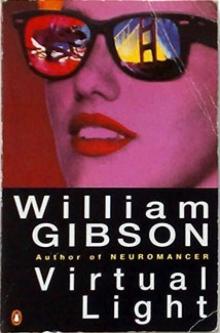 Virtual Light
Virtual Light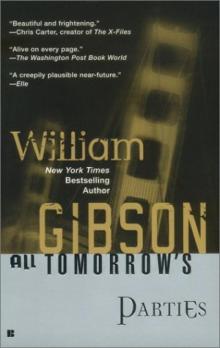 All Tomorrow's Parties
All Tomorrow's Parties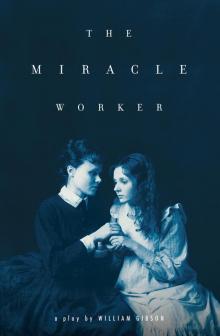 The Miracle Worker
The Miracle Worker Disneyland with the Death Penalty
Disneyland with the Death Penalty Idoru tb-2
Idoru tb-2 Count Zero s-2
Count Zero s-2 The Gernsback Continuum
The Gernsback Continuum New Rose hotel (tales)
New Rose hotel (tales)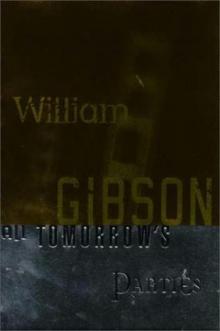 All Tomorrow's Parties bt-3
All Tomorrow's Parties bt-3 Hinterlands
Hinterlands Thirteen Views Of A Cardboard City
Thirteen Views Of A Cardboard City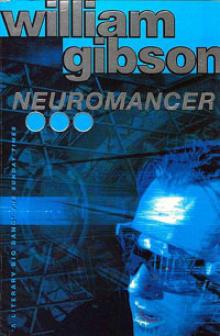 Neuromancer ts-1
Neuromancer ts-1 Virtual light b-1
Virtual light b-1